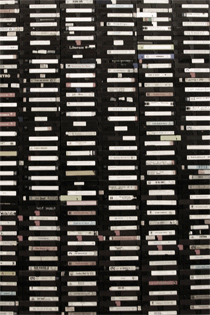Romain Grandinetti | 25.05.2021
How did we become consumers ? Athony Galluzzo explores the conversion of Westerners to consumerism during the 19th and 20th centuries. In this transdisciplinary approach, he highlights the significant social mutations induced by this change in the relationship of men to materiality which results in the constitution of a merchant society. The author also points how the merchants enforce their power in this type of society. [...]
De bonnes raisons pour se faire des cheveux
Xavier Bernier, Olivier Lazzarotti et Jacques Lévy | 30.04.2021
Human hairs are easy to lay out and are strongly mobilised in the social presentation of selves. They have their own language, including synonyms, homonyms, and oxymorons. For a long time, they acted as formidable markers of communal allegiance. They are gradually becoming resources for individuals’ body freedom. [...]
Le coworking fait-il tiers-lieu ?
Pierre-Mathieu Le Bel | 12.04.2021
Geographer, researcher and trainer at CREFAD Auvergne as well as Associate researcher at the UMR Territoires of Clermont-Ferrand, he is specialized in social and cultural geography. He is currently interested in questions related to the construction of commons, access to land, food governance, participatory mechanisms, power relations between individuals and social groups as well as the spatial expression of these power relations, heritage, and food sovereignty. He mostly adopts a critical perspective as well as collaborative or action research [...]
Nacima Baron | 07.04.2021
Bruce Begout is a philosopher but also a novelist. Lecturer at the University of Bordeaux, member of the Sciences, Philosophie, Humanités Department (EA 4574), he has written several books on the exploration of urban worlds, everyday life and "common" places. He is also a specialist in Wittgenstein and Husserl. He carries out research on phenomenology, the philosophy of action, analytical philosophy, the philosophy of science, language and logic. [...]
Qui métrise quoi ?
Xavier Bernier, Olivier Lazzarotti et Jacques Lévy | 01.04.2021
The widespread use of GPS in route planners has opened the field to new relationships with mobility practices. It sometimes leads to mistakes, comical or tragic. This raises the question of our ability to integrate these new technologies without becoming "geographically challenged". This is not an abandonment of competence, but a temporary and agreed delegation of our own metrics. [...]
L’exemple du quartier de Teisseire rénové.
Karin Schaeffer et Paulette Duarte | 18.03.2021
This article aims to understand the impacts of urban transformations on the social representations of the inhabitants of so-called «sensitive» neighbourhoods. While the external image of some of these neighbourhoods is still pejorative, do the inhabitants of these neighbourhoods represent their housing and living conditions differently after renovation? How has the urban renewal of neighbourhoods affected the social representations of their inhabitants? What are the reasons behind these impacts? To answer these questions, the authors propose to compare the [...]
Corbin Alain. 2020. Terra Incognita. Une histoire de l’ignorance, XVIIIe-XIXe siècle. Paris : Albin Michel.
Olivier Lazzarotti | 17.03.2021
By the originality of the theme and the approach, the work covering the period 1755-1900, is indeed that of Alain Corbin. Passing the discussions on the notion of ignorance, it opens up to both fundamental and contemporary questions on human interrelationships as well as the predictability of the world. [...]
Alain Guez et Piero Zanini | 12.03.2021
The aim is to grasp the question of rhythms through an anthropological approach to the experience of urban time as it has emerged from various surveys conducted in Paris and its metropolitan region. Questioning the modalities by which certain "inhabitants" (residents and temporary residents) describe their experiences from a temporal point of view, reveals a set of elements capable of characterizing, qualifying and giving substance to the concrete and/or sensitive modalities through which an experience of time takes shape [...]
Une nouvelle notion pour penser les dynamiques urbaines en sciences sociales
Margaux Vigne | 08.03.2021
Our lifestyles and the urban spaces in which we operate are the theater for the development of multiple and increasing forms of saturation. The texts gathered in this book search to identify, describe and analyze these phenomena, both spatial and temporal or social. Broadly, the challenge of this book is to make saturations a new field of research in social sciences. The challenge has been taken in the sense that, despite the own limits of the book, it shows [...]
Xavier Bernier, Olivier Lazzarotti et Jacques Lévy | 01.03.2021
The fire at Notre-Dame, during the night of 15 to 16 April 2019, opened the site for its reconstruction. It also freed up words and debate around the various projects presented. As none of them can be understood only in terms of technical solutions, we must ask ourselves what are the meanings and political implications of the proposals. Even more so those of the solution chosen. [...]

